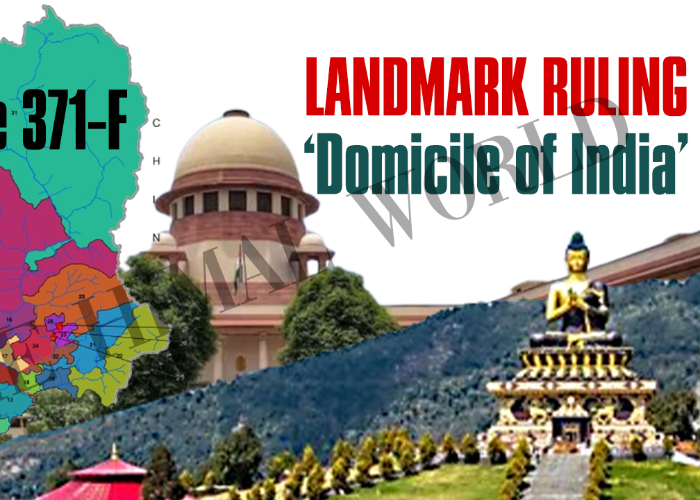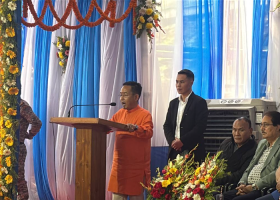The Himal World
Gangtok, 30 January
In a landmark judgement that could have far-reaching repercussions in the Himalayan state of Sikkim, the Supreme Court on Wednesday ruled that reservation in public employment based on residence in a particular state was unconstitutional.
In a case of Tanvi Behl v. Shrey Goel & Others, the apex court reaffirmed that all Indians have a single domicile—the "Domicile of India."
A three-judge bench comprising Justice Hrishikesh Roy, Justice Sudhanshu Dhulia, and Justice SVN Bhatti held that the concept of regional or provincial domicile was alien to the Indian legal system and that no state government could grant employment reservations based on residence criteria. The ruling also struck down residence-based reservations in PG medical admission, stating that domicile was a legal concept relevant only in jurisdictions where multiple legal systems exist within a country, which is not the case in India.
In Sikkim, a Certificate of Identification (COI), or a Domicile Certificate, is a must for employment in government departments, for land transactions, and other government services. Following the judgement, political parties in Sikkim have voiced concerns about the judgement, and have demanded that the ruling Sikkim Krantikari Morcha (SKM) government come clear on its stand on the matter.
“The Supreme Court’s recent judgment declaring that the concept of regional or provincial domicile is alien to the Indian legal system has sent shockwaves across Sikkim. While the ruling pertains to residence-based reservations in PG medical admissions, its broader implications on Sikkim’s special status under Article 371F cannot be ignored. The Citizen Action Party – Sikkim (CAP-S) demands that the SKM government immediately clarify whether this judgment will affect the rights of Sikkim Subject Certificate (SSC) and Certificate of Identification (COI) holders,” Citizen Action Party (CAP) said in a press statement.
“The CAP-S firmly believes that the concept of domicile is at the core of Sikkim’s special status. If all citizens of India carry a single domicile, as the Supreme Court states, does this mean that the protections granted under Article 371F will be rendered meaningless? Will the SSC and COI lose their significance in future legal interpretations? These are urgent questions that demand immediate answers from the SKM-led government,” the party’s vice president (political affairs), Bhushan Adhikari, said in the release.
The apex court, in its ruling, meanwhile observed: "Each citizen of this country carries with him or her, one single domicile which is the 'Domicile of India'. The concept of regional or provincial domicile is alien to the Indian legal system."
It further clarified that Article 15 of the Constitution prohibits discrimination based on residence, while Article 16 explicitly bars states from granting public employment reservations on the basis of residence criteria. The only exception, under Article 16(3), enables only the Parliament—not state governments—to prescribe residence requirements for certain state jobs.
The judgment referred to Constituent Assembly debates, highlighting that the framers of the Constitution had overwhelmingly rejected the idea of residence-based employment criteria. Since India has a single citizenship, the dominant sentiment was that all citizens should have the right to reside and seek employment anywhere in the country. The ruling also emphasized that permanent residence and domicile are distinct concepts and that states cannot use domicile as a basis for employment reservations.
The Court cited the landmark Pradeep Jain vs Union of India (1984) case, reiterating that state governments often misuse the term "domicile" to mean "permanent residence."
However, in legal terms, domicile determines an individual’s personal law and not their eligibility for public employment or PG medical admission. The judgment, authored by Justice Sudhanshu Dhulia, stated, "In short, the very concept of a provincial or state domicile in India is a misconception. There is only one domicile in India, which we refer to as domicile in the territory of India as given under Article 5. All Indians have only one domicile, which is the Domicile of India."
The Court further emphasized that every Indian citizen has the constitutional right to live, work, and study anywhere in the country without being restricted by state-based domicile rules. It stated, "We are all domiciled in the territory of India. We are all residents of India. Our common bond as citizens and residents of one country gives us the right not only to choose our residence anywhere in India, but also gives us the right to carry on trade & business or a profession anywhere in India. It also gives us the right to seek admission in educational institutions across India."










Leave a Comment